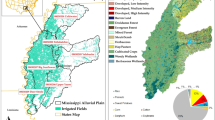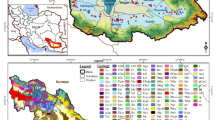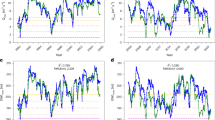Abstract
Aquifer depletion due to intensive irrigation threatens global economies, food security and ecosystems. This Perspective examines the hydrological, social and economic complexities of managing groundwater resources, focusing on the Sheridan 6 Local Enhanced Management Area in the US High Plains aquifer. Here irrigator-led conservation efforts reduced groundwater use by 25% and slowed aquifer depletion by 65% while maintaining farmers’ incomes. This success resulted from a hybrid integration of bottom-up rule development with top-down enforcement, providing flexible multi-year water allocations and aligning management with local conditions. From this, we identify transferable governance tenets for sustainable groundwater management in similar regions.
This is a preview of subscription content, access via your institution
Access options
Access Nature and 54 other Nature Portfolio journals
Get Nature+, our best-value online-access subscription
27,99 € / 30 days
cancel any time
Subscribe to this journal
Receive 12 digital issues and online access to articles
118,99 € per year
only 9,92 € per issue
Buy this article
- Purchase on SpringerLink
- Instant access to full article PDF
Prices may be subject to local taxes which are calculated during checkout




Similar content being viewed by others
References
Alley, W. M. & Alley, R. High and Dry: Meeting the Challenges of the World’s Growing Dependence on Groundwater (Yale Univ. Press, 2017).
Aeschbach-Hertig, W. & Gleeson, T. Regional strategies for the accelerating global problem of groundwater depletion. Nat. Geosci. 5, 853–861 (2012).
Hoekstra, A. Y. & Chapagain, A. K. in Integrated Assessment of Water Resources and Global Change: A North-South Analysis (eds Craswell, E. et al.) 35–48 (Springer, 2007); https://doi.org/10.1007/978-1-4020-5591-1_3
Butler, J. J., Whittemore, D. O., Wilson, B. B. & Bohling, G. C. Sustainability of aquifers supporting irrigated agriculture: a case study of the High Plains aquifer in Kansas. Water Int. 43, 815–828 (2018).
Huggins, X. et al. Hotspots for social and ecological impacts from freshwater stress and storage loss. Nat. Commun. 13, 439 (2022).
Zipper, S. et al. Quantifying streamflow depletion from groundwater pumping: a practical review of past and emerging approaches for water management. J. Am. Water Resour. Assoc. 58, 289–312 (2022).
Jakeman, A. J. et al. in Integrated Groundwater Management: Concepts, Approaches and Challenges (eds Jakeman, A. J. et al.) 3–20 (Springer, 2016); https://doi.org/10.1007/978-3-319-23576-9_1
Allen, J. J. & Smith, S. M. Market-oriented solutions for groundwater commons through collective-action. Environ. Res. Lett. 18, 045006 (2023).
Sanderson, M. R. & Hughes, V. Race to the bottom (of the well): groundwater in an agricultural production treadmill. Soc. Probl. 66, 392–410 (2019).
Butler, J. J. & Johnson, C. K. Groundwater depletion: a global challenge for intergenerational equity. Interpretation 78, 7–18 (2024).
Gibson, J. W. & Gray, B. J. (eds) in The Economics of Ecology, Exchange, and Adaptation: Anthropological Explorations Vol. 36, 3–32 (Emerald Group, 2016).
Pfeiffer, L. & Lin, C.-Y. C. Does efficient irrigation technology lead to reduced groundwater extraction? Empirical evidence. J. Environ. Econ. Manage. 67, 189–208 (2014).
Ibor, C. S. et al. Advancing co-governance through framing processes: insights from action-research in the Requena-Utiel aquifer (eastern Spain). ICJ 17, 347–362 (2023).
Marston, L. T. et al. The importance of fit in groundwater self-governance. Environ. Res. Lett. 17, 111001 (2022).
Wang, T., Park, S. C. & Jin, H. Will farmers save water? A theoretical analysis of groundwater conservation policies. Water Resour. Econ. 12, 27–39 (2015).
Ostrom, E., Janssen, M. A. & Anderies, J. M. Going beyond panaceas. Proc. Natl Acad. Sci. USA 104, 15176–15178 (2007).
Molle, F. & Closas, A. Comanagement of groundwater: a review. WIREs Water 7, e1394 (2020).
Rouillard, J., Babbitt, C., Pulido-Velazquez, M. & Rinaudo, J.-D. Transitioning out of open access: a closer look at institutions for management of groundwater rights in France, California, and Spain. Water Resour. Res. 57, e2020WR028951 (2021).
Griggs, B. W., Sanderson, M. R. & Miller-Klugesherz, J. A. Farmers are depleting the Ogallala aquifer because the government pays them to do it. ABA https://www.americanbar.org/groups/environment_energy_resources/resources/trends/2022/farmers-depleting-ogallala-aquifer-because-government-pays-them-do-it/ (2022).
Butler, J. J., Bohling, G. C., Whittemore, D. O. & Wilson, B. B. Charting pathways toward sustainability for aquifers supporting irrigated agriculture. Water Resour. Res. 56, e2020WR027961 (2020).
Perez-Quesada, G. & Hendricks, N. P. Lessons from local governance and collective action efforts to manage irrigation withdrawals in Kansas. Agric. Water Manage. 247, 106736 (2021).
Drysdale, K. M. & Hendricks, N. P. Effects of Collective Action Water Policy on Kansas Farmers’ Irrigation Decisions: The Case of the Sheridan County 6 LEMA (ACCC, 2016).
Whittemore, D. O., Butler, J. J., Bohling, G. C. & Wilson, B. B. Are we saving water? Simple methods for assessing the effectiveness of groundwater conservation measures. Agric. Water Manage. 287, 108408 (2023).
Whittemore, D. O., Butler, J. J. & Wilson, B. B. Status of the High Plains Aquifer in Kansas (KGS, 2023); https://www.kgs.ku.edu/Publications/Bulletins/TS22/
Griggs, B. Reaching consensus about conservation: High Plains lessons for California’s Sustainable Groundwater Management Act. U. Pac. L. Rev. 52, 495–547 (2021).
Water Information Management and Analysis System (WIMAS) (KDA DWR, accessed 1 September 2024); https://geohydro.kgs.ku.edu/geohydro/wimas/
Order of Designation Regarding the Sheridan 6 Local Enhanced Management Plan Within Groundwater Management District No. 4 (KDA, 2013).
Deines, J. M., Kendall, A. D., Butler, J. J. & Hyndman, D. W. Quantifying irrigation adaptation strategies in response to stakeholder-driven groundwater management in the US High Plains aquifer. Environ. Res. Lett. 14, 044014 (2019).
Drysdale, K. M. & Hendricks, N. P. Adaptation to an irrigation water restriction imposed through local governance. J. Environ. Econ. Manage. 91, 150–165 (2018).
Golden, B. Monitoring the Impacts of Sheridan County 6 Local Enhanced Management Area (LEMA, 2018).
Steiner, J. L. et al. Policy, technology, and management options for water conservation in the Ogallala aquifer in Kansas, USA. Water 13, 3406 (2021).
Lauer, S. & Sanderson, M. ‘We’re Civilized People Out Here’: Managing Groundwater Together in Western Kansas (CSU Water Centre, 2017).
Deines, J. M. et al. Transitions from irrigated to dryland agriculture in the Ogallala aquifer: land use suitability and regional economic impacts. Agric. Water Manage. 233, 106061 (2020).
Smith, S. & Gebben, A. Is saving water enough? The economic sustainability of a groundwater fee. In Proc. AGU Fall Meeting H12C-06 (AGU, 2021).
Deines, J. M., Kendall, A. D., Butler, J. J., Basso, B. & Hyndman, D. W. Combining remote sensing and crop models to assess the sustainability of stakeholder-driven groundwater management in the US High Plains aquifer. Water Resour. Res. 57, e2020WR027756 (2021).
Perez-Quesada, G., Hendricks, N. P. & Steward, D. R. The economic cost of groundwater depletion in the High Plains aquifer. J. Assoc. Environ. Resour. Econ. https://doi.org/10.1086/726156 (2023).
Glose, T. J. et al. Quantifying the impact of lagged hydrological responses on the effectiveness of groundwater conservation. Water Resour. Res. 58, e2022WR032295 (2022).
Shipan, C. R. & Volden, C. Policy diffusion: seven lessons for scholars and practitioners. Public Adm. Rev. 72, 788–796 (2012).
Lauer, S. & Sanderson, M. R. Producer attitudes toward groundwater conservation in the US Ogallala–High Plains. Groundwater 58, 674–680 (2020).
Griggs, B. W. The allocation of groundwater: from superstition to science. Environ. Sci. https://doi.org/10.1093/acrefore/9780199389414.013.638 (2024).
Smidt, S. J. et al. Complex water management in modern agriculture: trends in the water–energy–food nexus over the High Plains aquifer. Sci. Total Environ. 566–567, 988–1001 (2016).
Zwickle, A., Feltman, B. C., Brady, A. J., Kendall, A. D. & Hyndman, D. W. Sustainable irrigation through local collaborative governance: evidence for a structural fix in Kansas. Environ. Sci. Policy 124, 517–526 (2021).
Young, R., Foster, T., Mieno, T., Valocchi, A. & Brozović, N. Hydrologic–economic trade-offs in groundwater allocation policy design. Water Resour. Res. 57, e2020WR027941 (2021).
Guilfoos, T., Khanna, N. & Peterson, J. M. Efficiency of viable groundwater management policies. Land Econ. 92, 618–640 (2016).
Good Farming Practices Protect Your Investment in Crop Insurance (USDA RMA, 2011).
Zipper, S. et al. Water Management Challenges and Potential Solutions Related to the US Federal Crop Insurance Program (KGS, 2024); https://www.kgs.ku.edu/Publications/OFR/2024/OFR2024-11.pdf
Bostic, D., Mendez-Barrientos, L., Pauloo, R., Dobbin, K. & MacClements, V. Thousands of domestic and public supply wells face failure despite groundwater sustainability reform in California’s Central Valley. Sci. Rep. 13, 14797 (2023).
Ostrom, E. Governing the Commons: The Evolution of Institutions for Collective Action. (Cambridge Univ. Press, 1990); https://doi.org/10.1017/CBO9780511807763
Baggio, J. A. et al. Explaining success and failure in the commons: the configural nature of Ostrom’s institutional design principles. IJC 10, 417 (2016).
Mansbridge, J. The role of the state in governing the commons. Environ. Sci. Policy 36, 8–10 (2014).
Shin, H. C. et al. How do resource mobility and group size affect institutional arrangements for rule enforcement? A qualitative comparative analysis of fishing groups in South Korea. Ecol. Econ. 174, 106657 (2020).
Schipanski, M. E. et al. Moving from measurement to governance of shared groundwater resources. Nat. Water 1, 30–36 (2023).
Lin, C.-Y., Orduna Alegria, M. E., Dhakal, S., Zipper, S. & Marston, L. PyCHAMP: a crop-hydrological-agent modeling platform for groundwater management. Environ. Model. Softw. 181, 106187 (2024).
Bohling, G. C., Butler, J. J., Whittemore, D. O. & Wilson, B. B. Evaluation of data needs for assessments of aquifers supporting irrigated agriculture. Water Resour. Res. 57, e2020WR028320 (2021).
Brookfield, A. E., Zipper, S., Kendall, A. D., Ajami, H. & Deines, J. M. Estimating groundwater pumping for irrigation: a method comparison. Groundwater 62, 15–33 (2023).
White, D. D. et al. Co‐producing interdisciplinary knowledge and action for sustainable water governance: lessons from the development of a water resources decision support system in Pernambuco, Brazil. Glob. Chall. 3, 1800012 (2018).
Sanderson, M. R. & Frey, R. S. Structural impediments to sustainable groundwater management in the High Plains aquifer of western Kansas. Agric. Hum. Values 32, 401–417 (2015).
Deines, J. M. et al. Mapping three decades of annual irrigation across the US High Plains aquifer using Landsat and Google Earth Engine. Remote Sens. Environ. 233, 111400 (2019).
Haacker, E. M. K., Kendall, A. D. & Hyndman, D. W. Water level declines in the High Plains aquifer: predevelopment to resource senescence. Groundwater 54, 231–242 (2016).
Acknowledgements
This work was supported by the National Science Foundation (NSF) grant no. RISE-2108196 (‘DISES: Toward resilient and adaptive community-driven management of groundwater-dependent agricultural systems’), National Aeronautics and Space Administration (NASA) grant no. 80NSSC22K1276 (‘Managing Temporal Trade-Offs through Irrigation and Yield Forecasting to Advance Groundwater Conservation’) and the Foundation for Food and Agriculture Research (FFAR) grant no. FF-NIA19-0000000084 (‘Achieving sustainable groundwater management through innovative governance and optimal agricultural water use under conflicting objectives’). Any opinions, findings and conclusions or recommendations expressed in this material are those of the author(s) and do not necessarily reflect the views of the NSF, NASA or FFAR. We also thank S. Kenyon, Northwest Groundwater Management District 4 Manager, and J. Tollefson for their useful comments on an earlier version of this article.
Author information
Authors and Affiliations
Contributions
M.E.O.A, S.Z. and J.J.B. developed the manuscript concept and led the writing. M.E.O.A, D.O.W. and B.B.W. prepared figures. All authors contributed to paper development and revision in their specific areas of expertise: social aspects: M.E.O.A, H.C.S., D.J.Y., B.W.G., S.L., M.R.S. and L.T.M.; hydrological aspects: M.E.O.A, S.Z., J.J.B, J.M.D., D.O.W., B.B.W., G.C.B. and C.-Y.L.; economic aspects: M.E.O.A, N.P.H., B.G., S.M.S., J.J.A. and Q.C.Y.
Corresponding authors
Ethics declarations
Competing interests
The authors declare no competing interests.
Peer review
Peer review information
Nature Sustainability thanks Mohammad Faiz Alam, Manuel Pulido-Velazquez and the other, anonymous, reviewer(s) for their contribution to the peer review of this work.
Additional information
Publisher’s note Springer Nature remains neutral with regard to jurisdictional claims in published maps and institutional affiliations.
Rights and permissions
Springer Nature or its licensor (e.g. a society or other partner) holds exclusive rights to this article under a publishing agreement with the author(s) or other rightsholder(s); author self-archiving of the accepted manuscript version of this article is solely governed by the terms of such publishing agreement and applicable law.
About this article
Cite this article
Orduña Alegría, M.E., Zipper, S., Shin, H.C. et al. Unlocking aquifer sustainability through irrigator-driven groundwater conservation. Nat Sustain 7, 1574–1583 (2024). https://doi.org/10.1038/s41893-024-01437-0
Received:
Accepted:
Published:
Issue Date:
DOI: https://doi.org/10.1038/s41893-024-01437-0
This article is cited by
-
Increased irrigation could mitigate future warming-induced maize yield losses in the Ogallala Aquifer
Communications Earth & Environment (2025)



